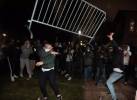DNA sampling violated rights of sex offender
An appeals court panel ruled Tuesday that a Metropolitan Police Department detective violated an inmate's rights when he forcefully extracted a DNA sample to determine whether the sex offender was involved in old sex offense cases.
In a 2-1 vote, a panel of the 9th U.S. Circuit Court of Appeals ordered Kenneth Friedman's case back to federal court in Las Vegas, where U.S. District Judge James Mahan had dismissed it in 2005.
Friedman contended his Fourth Amendment rights were violated after he was arrested in 2003 on charges related to stalking an individual at a health club and making threatening calls. As a pretrial detainee, he refused to submit to a DNA test requested by Las Vegas police Detective Dolphus Boucher.
Boucher received permission from Clark County Deputy District Attorney Ellisa Luzaich to place Friedman's DNA in a cold-case bank.
Friedman said he was in shackles and chained to a metal bar when Boucher forcefully swabbed his mouth.
In dismissing Friedman's case, Mahan said Boucher and Luzaich were entitled to "qualified immunity," which shields government officials from being sued for violating an individual's constitutional rights.
Two of the three judges sitting on the appellate panel said authorities had no right to forcefully take Friedman's DNA sample for the purpose of placing it in a cold-case bank.
They also noted that the DNA was never entered into the cold-case database.
"Neither the Supreme Court nor this court has ever ruled that law enforcement officers may conduct suspicionless searches on pretrial detainees for reasons other than prison security," said the opinion, written by Judge Sidney Thomas.
Thomas also dismissed the qualified-immunity argument because Friedman's rights were clear when Boucher took the sample.
The opinion said that in 1980, Friedman was arrested and pleaded guilty to rape in Montana. He was released in 2001 and moved to Las Vegas. He was not on parole or probation when he was arrested by police.
"The Nevada authorities extracted the DNA from Friedman not because they suspected he had committed a crime, nor to aid in his reintegration into society, nor as a matter of his continuing supervision," Thomas wrote.
"Their purpose was simply to gather human tissue for a law enforcement databank, an objective that does not cleanse an otherwise unconstitutional search."
Thomas said the proper process for the detective would have been to secure a search warrant, but the judge noted the request probably would have been denied because no probable cause existed.
The dissenting vote came from Judge Consuelo Callahan, who called the "minimally invasive search 'reasonable.'"
Callahan said inmates should expect little privacy under the Fourth Amendment.
She also said that the government has an interest in identifying repeat sex offenders.
"Here, Friedman, a convicted sex offender, was a pre-trial detainee facing charges of indecent exposure and open and gross lewd conduct when the state officials took a buccal swab from the inside of his mouth," she wrote.
Judge Jane Roth sided with Thomas.
Contact reporter Adrienne Packer at apacker@reviewjournal.com or 702-384-8710.























